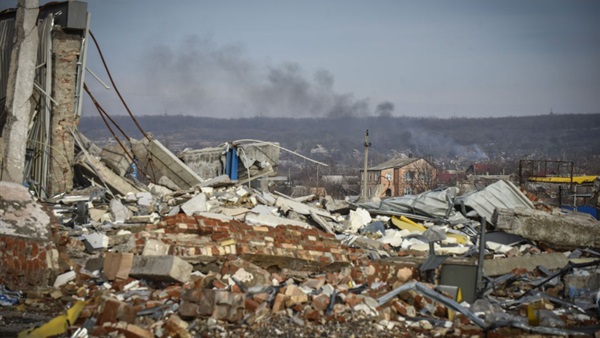Pressure Builds on Germany to Approve Tanks for Ukraine

Pressure mounted on Germany to approve the transfer of its
Leopard 2 battle tanks to Ukraine, a day after Western allies meeting at the
U.S. Ramstein Air Base in Germany failed to reach an agreement about sending
armored vehicles.
Edgars Rinkēvičs, Latvia’s foreign minister, said on Twitter
Saturday morning that he and his counterparts from Lithuania and Estonia “call
on Germany to provide Leopard tanks to Ukraine now. This is needed to stop
Russian aggression, help Ukraine and restore peace in Europe quickly. Germany
as the leading European power has special responsibility in this regard.”
Zbigniew Rau, the Polish foreign minister, said late Friday
that “Ukrainian blood” was the price for the delay in sending Leopard tanks.
Poland’s defense minister, meanwhile, told the Voice of America on Friday that
it would begin training Ukrainian fighters on the Leopard tanks, even without
German approval, while an adviser to Ukrainian President Volodymyr Zelensky,
Mykhailo Podolyak, Saturday tweeted his irritation over the lack of movement on
the tanks issue.
“Today’s indecision is killing more of our people,” he
posted. “Every day of delay is the death of Ukrainians. Think faster.”
North Atlantic Treaty Organization members in Europe have
fixed on the Leopard 2 tanks as the best option for Ukraine, in large part
because they are among the most common tanks in Europe. Modern battle tanks
will be essential to any Ukrainian counteroffensives to regain territory,
Western officials and analysts say.
German officials initially said they wouldn’t approve
sending Leopards unless the U.S. provided its own Abrams tanks, which the U.S.
has so far declined to do, saying they are too difficult to maintain. Germany’s
new defense minister, Boris Pistorius, has told German television that German
and U.S. tanks don’t need to be provided at the same time and indicated that
his government was still weighing what to do.
Mr. Pistorius also said that allies should start training
Ukrainian troops in the use of Leopard tanks, in case a decision is made in the
coming days.
Mr. Zelensky has expressed growing frustration about the
delay.
“We will still have to fight for the supply of modern tanks,
but every day we make it more obvious there is no alternative to making the
decision on tanks,” Mr. Zelensky said in his nightly video address on Friday.
President Biden, meanwhile, on Friday responded to a
question at the White House on whether the U.S. supports Poland’s call to
provide Leopard tanks to Kyiv by saying, “Ukraine is going to get all the help
they need.”
While Kyiv’s allies debate their next steps, Moscow
continues to claim incremental gains in Ukraine’s east. After seizing the town
of Soledar, north of Bakhmut, last week, the Kremlin said Friday that its
troops had captured the settlement of Klishchiivka, to the south. Wagner Group,
the Russian paramilitary force, said it had captured Klishchiivka earlier in
the week without help from regular Russian forces.
Moscow on Saturday also claimed gains in Ukraine’s south.
Russia’s Defense Ministry said an offensive in the partially occupied
Zaporizhzhia region had allowed Russian troops to occupy more advantageous
positions. Vladimir Rogov, a Russian-installed official in the Zaporizhzhia
region, said on his Telegram channel Friday that Russian forces had progressed
about 7 kilometers, or 4 miles, after launching an offensive there and captured
at least seven villages.
Ukrainian officials didn’t comment on Russia’s claimed
advances in Klishchiivka or the Zaporizhzhia region, saying only that there was
fighting in both areas.
The British Ministry of Defense, meanwhile, said the
conflict was largely frozen, with little progress for either side in the
Zaporizhzhia region—Russian forces making incremental gains around Bakhmut while
Ukrainian forces likely made progress further north, near Kremina, in the
Luhansk region.
“Overall, the conflict is in a state of deadlock. However,
there is a realistic possibility of local Russian advances around Bakhmut,” the
ministry wrote Saturday on Twitter.
Meanwhile, the White House on Friday said that the U.S.
would designate the Wagner Group as a transnational criminal organization.
John Kirby, the National Security Council coordinator for
strategic communications, said that Wagner had about 50,000 troops in Ukraine,
of whom about 40,000 were convicts. Wagner’s leader, Yevgeny Prigozhin, has
been openly recruiting men from prisons to fight in Ukraine, telling them that
if they survive, their criminal records will be wiped clean. Mr. Kirby added
that Wagner was also becoming a rival power center to the Russian military.
“Wagner is a criminal organization that is…committing
widespread atrocities and human rights abuses, and we will work relentlessly to
identify, disrupt, expose, and target those who are assisting Wagner,” Mr.
Kirby said.
While President Vladimir Putin has described his invasion as
a special military operation, state-media messaging in recent months has
increasingly cast the conflict as one pitting Moscow against the West through a
proxy war in Ukraine.
On Saturday, deputy chairman of Russia’s Security Council
and former President Dmitry Medvedev called the conflict a new Patriotic War,
using Moscow’s term for World War II, now between Russia and Ukraine along with
Western Europe.
“Our country defeated
Napoleon and Hitler,” he wrote on Telegram. “And victory will be ours. Like in
1812 and 1945.”









